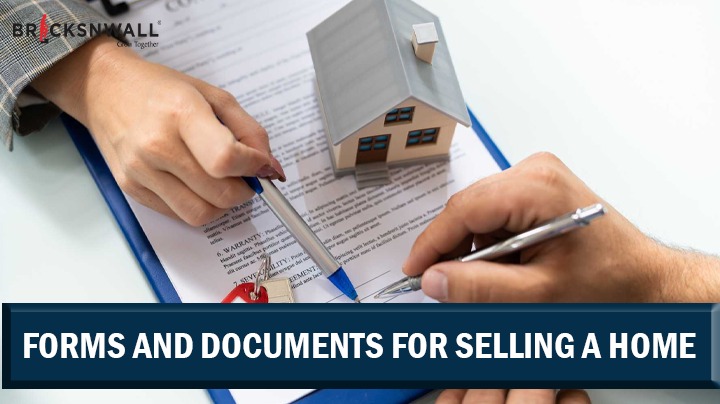Documents and forms needed to sell a house
Bricksnwall Trusted Experts

Make sure you have the necessary paperwork and
forms on hand for a hassle-free and easy house-selling process. The building
plan and title deed are a couple of these. See which documents, at each stage
of the home-selling process, must be given to the buyer by reading the article
below.
A few key documents, like the building plan,
completion and occupancy certificates, title deed, and others, need to be kept
on hand when you decide to sell your house. It would be helpful to have the
other documents prepared, as that would seal your sincere purpose to sell the
property and the legal status of the property, even though some documents, like
the sale deed, would be created later on when the deal advances. If key records
are missing, purchasers may become disinterested because they believe the
property is mired in legal problems.
Therefore, for a smooth transfer, having all the
paperwork ready before deciding to sell a property is crucial. The following
documents must be kept up-to-date, regardless of how old the house is.
Sale agreement
A legal document that certifies the sale and
transfer of property to the buyer is called a sale deed. It includes important
information on the parties, such as their name, age, residence, and line of
work. A sale deed also includes property-related details including carpet area,
location, sale price, and date of possession, among other things. Producing
this document is particularly crucial when selling a property because it
demonstrates your legitimate ownership and the authority to sell the asset.
Construction plan
You can save a lot of future problems by obtaining
a copy of an approved building plan from a competent body, which details
whether or not the work on the site is permitted. Get the Sample here.
Certificate of Encumbrance
This document attests to the fact that the property
is free of debt, including mortgages. It includes a detailed list of all the
transactions made on the property within the last 12 years. You can apply to
the sub-registrar's office in order to obtain the encumbrance certificate.
Certificate of Completion
An attestation from the appropriate authorities
confirming that the structure was built in compliance with the approved
construction plan's rules and regulations is known as a completion
certificate. A certificate of completion is necessary for a number of reasons:
gives assurance that the building was built in
accordance with the authorized plan.
Savings from court actions like demolition and
eviction
required in order to get an occupancy certificate
(OC), without which it is not permitted to occupy a building.
is a requirement in order to obtain an electricity
and water connection.
Certificate of Occupation
Upon project completion, an occupancy certificate
is a document provided by the planning authority or local government. The
building's suitability for occupancy and completion are attested to by the
certificate.
Utility bills and tax receipts
To make sure there are no unpaid debts, a copy of
the payment receipts for previous utility bills, property tax, stamp duty, and
registration must be provided. In addition, the buyer needs these receipts in
order to apply for house financing.
Certificates of No-Objection (NOCs)
Prior to commencing construction, the builder needs
the NOC from multiple government agencies. NOCs from at least 19
departments—from the Fire and Safety Department to the Pollution Control
Board—are mandated in several states. To confirm that all necessary government
approvals are in place at the time of sale, these NOCs are crucial.
Certificate of Succession (if you are selling an
inherited asset)
The civil court issues the paperwork to the
surviving family members of the deceased. Your right to sell the asset and take
the proceeds on behalf of the departed is established by the Succession
Certificate. When a property owner passes away intestate, or without a will, it
is crucial. A succession certificate includes all of the deceased's
information, the legal heir's information, and a summary of all transferred
assets and debts.
Khata certification
The certificate includes details about taxes,
built-up area, and other aspects of the property. It ascertains the precise
property owner and tax liability. Though it is only legal in the State of
Karnataka, the document is very necessary for a hassle-free real estate
transaction.
Patta
A legal document known as a patta, patta is issued
in the true owner's name. It is available from the Tahsildar's office and
includes the following information:
- The
district name
- Patta
number
- Owner's
name,
- survey
number, and subdivision
- Land
area and tax information
- Land
type, i.e., whether it is a marsh or dry land
But only in the State of Tamil Nadu is Patta
necessary for the sale of real estate.
Authorization from banks for unpaid house loans
Two prerequisites apply in this instance:
You can take the buyer's sale consideration and
use it to repay the outstanding loan balance by paying off the outstanding
balance. However, in this instance, the bank's in-principle consent is
necessary.
Alternatively, you can provide the buyer the loan after taking the agreed-upon deductions for the amount paid and the profit from the sale. In this instance, though, the bank will conduct due diligence before authorizing the transfer.
Related blog : https://www.bricksnwall.com/blog/necessary-forms-while-buying-home




